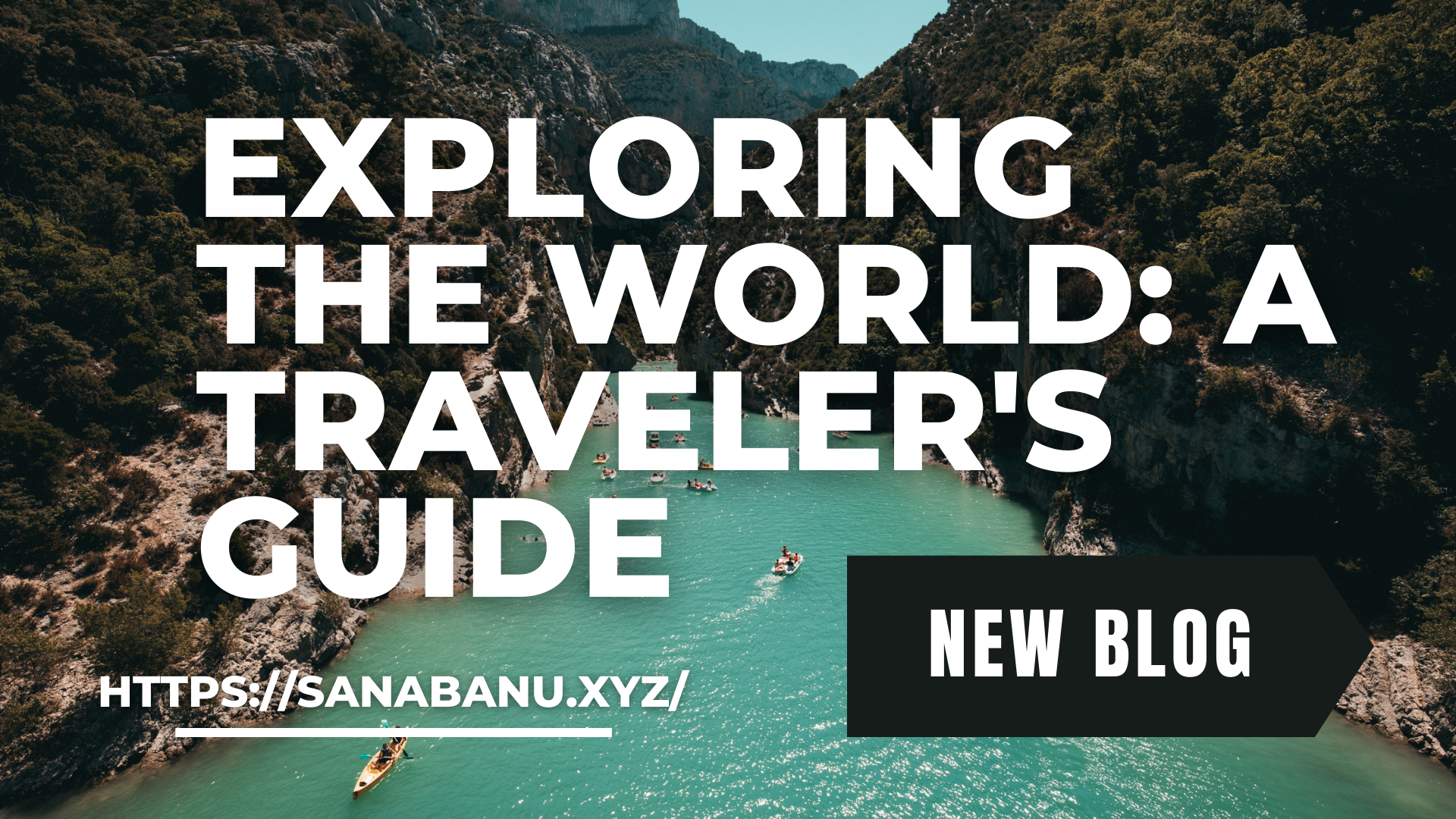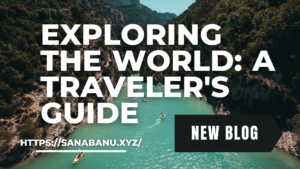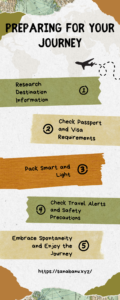
Exploring the World: A Traveler’s Guide
Exploring the World: A Traveler’s Guide
Introduction:
Travelling, an inherently human pursuit, offers a gateway to exploration, discovery, and personal enrichment. Whether seeking adventure, cultural immersion, or relaxation, the world beckons with an array of destinations, each with its unique allure. This comprehensive guide aims to inspire and assist travellers in embarking on transformative journeys, offering insights, tips, and recommendations for a fulfilling and enriching travel experience.
Preparing for Your Journey: A Traveler’s Guide
- Research Destination Information:
- Conduct comprehensive research about your destination. Learn about its culture, local customs, language, currency, climate, and any specific travel advisories or regulations. Gather information about places of interest, local cuisine, and essential phrases in the local language.
- Create a Travel Itinerary:
- Plan an itinerary outlining your travel schedule, including transportation, accommodations, activities, and sightseeing plans. Having a flexible itinerary ensures a structured yet adaptable travel experience.
- Check Passport and Visa Requirements:
- Ensure your passport is valid for the entire duration of your trip and check visa requirements for your destination country. Arrange necessary visas well in advance to avoid any last-minute hassles.
- Vaccinations and Health Precautions:
- Check vaccination requirements and health recommendations for your destination. Schedule necessary vaccinations and carry essential medications or prescriptions, adhering to any health precautions advised for the region.
- Travel Insurance and Documentation:
- Purchase travel insurance that covers medical emergencies, trip cancellations, or unexpected events. Organize and carry all essential documents, including identification, travel insurance, tickets, reservations, and emergency contact information.
- Pack Smart and Light:
- Create a packing list and pack essentials based on the destination’s climate, activities, and duration of your trip. Pack light, versatile clothing, essential toiletries, and any specific gear or equipment required for activities.
- Money Matters and Currency Exchange:
- Inform your bank about your travel plans to avoid any issues with using your cards abroad. Exchange currency or obtain local currency before your trip or upon arrival to ensure you have necessary funds.
- Secure Important Belongings:
- Safeguard important belongings such as passports, tickets, cash, and electronic devices. Consider using a money belt, travel locks, or secure bags to prevent theft or loss while traveling.
- Learn Basic Local Phrases:
- Familiarize yourself with basic phrases in the local language. Learning greetings, thank-yous, and common phrases can facilitate communication and show respect for the local culture.
- Arrange Transportation and Airport Transfers:
- Plan transportation from the airport to your accommodation in advance. Consider pre-booking airport transfers or researching public transportation options to ensure a smooth arrival at your destination.
- Notify Trusted Contacts:
- Inform trusted friends or family members about your travel itinerary, including your accommodation details and contact information. Provide them with a copy of important documents for emergency purposes.
- Check Travel Alerts and Safety Precautions:
- Stay updated on travel advisories, safety tips, and any alerts for your destination. Be aware of local laws, customs, and potential safety concerns to ensure a secure and enjoyable travel experience.
- Confirm Reservations and Check-In Online:
- Confirm reservations for accommodations, flights, or tours before departure. Take advantage of online check-ins to save time and avoid long queues at airports or hotels.
- Familiarize Yourself with Maps and Directions:
- Review maps and directions of your destination, including public transportation routes or walking directions to key locations. This helps you navigate efficiently upon arrival.
- Embrace Spontaneity and Enjoy the Journey:
- While planning is essential, leave room for spontaneity and unexpected discoveries. Embrace the unpredictability of travel, be open to new experiences, and immerse yourself in the journey.
Here are additional points to consider when choosing your destination:
- Personal Interests and Preferences:
- Consider your personal interests, hobbies, and preferences when selecting a destination. Whether you enjoy outdoor adventures, cultural experiences, beach relaxation, historical sites, culinary explorations, or vibrant city life, choose a destination that aligns with your interests.
- Travel Season and Weather:
- Research the climate and weather conditions of potential destinations during your planned travel dates. Consider whether you prefer warm or cold climates, rainy or dry seasons, and plan accordingly to ensure an enjoyable experience.
- Budget and Cost of Living:
- Evaluate your budget and the cost of living in different destinations. Factor in expenses such as accommodation, transportation, dining, activities, and currency exchange rates to select a destination that suits your financial plan.
- Duration of Travel:
- Determine the length of your trip and choose a destination that complements your available time. For shorter trips, consider destinations closer to home or with convenient transportation options. For longer journeys, explore destinations that offer diverse experiences.
- Safety and Travel Alerts:
- Prioritize safety by checking travel advisories, safety ratings, and any potential risks associated with your chosen destinations. Research political stability, health concerns, crime rates, and safety precautions to make an informed decision.
- Accessibility and Ease of Travel:
- Consider the accessibility of the destination. Check transportation options, flight availability, visa requirements, and ease of travel, especially if you have specific preferences or restrictions related to transportation modes.
- Language and Culture:
- Explore destinations with languages or cultures that intrigue you. Whether you’re interested in learning a new language or immersing yourself in a unique cultural experience, choosing a destination aligned with your cultural interests can enhance your travel experience.
- Activities and Attractions:
- Research the array of activities, attractions, and experiences available at different destinations. Whether it’s exploring natural landscapes, historical landmarks, museums, adventure sports, or culinary tours, select a destination that offers the experiences you desire.
- Off-the-Beaten-Path or Popular Destinations:
- Decide whether you prefer visiting popular tourist destinations or exploring off-the-beaten-path locations. Popular destinations offer iconic landmarks and attractions, while lesser-known places often provide unique, authentic experiences.
- Accommodation and Lodging Options:
- Consider the types of accommodations available, such as hotels, resorts, hostels, vacation rentals, or boutique accommodations. Choose a destination that offers lodging options that suit your preferences and budget.
- Recommendations and Reviews:
- Seek recommendations from friends, family, travel forums, or online reviews to gather insights and opinions about potential destinations. Personal recommendations or reviews can offer valuable perspectives.
- Solo or Group Travel Preferences:
- Determine whether you prefer traveling solo, with a partner, family, friends, or joining group tours. Consider destinations that cater to your preferred travel style and social preferences.
- Return Visit or Exploring New Places:
- Decide whether you want to revisit a beloved destination or explore new places. Balancing familiarity with novelty allows for a mix of cherished experiences and new discoveries.
- Accessibility of Amenities and Services:
- Assess the availability of necessary amenities and services at the destination, such as healthcare facilities, accessibility for people with disabilities, internet connectivity, and convenience for specific needs or preferences.
- Personal Goals and Bucket List:
- Consider destinations that align with your personal goals, aspirations, or bucket list items. Whether it’s fulfilling a lifelong dream, accomplishing a challenging hike, or experiencing a specific cultural event, prioritize destinations that resonate with your aspirations.
Conclusion:
Travelling isn’t just about visiting new places; it’s an opportunity for personal growth, cultural exchange, and creating lasting memories. With thorough preparation, respect for local cultures, and a mindset of exploration, travellers can embark on journeys that go beyond sightseeing, fostering connections, broadening perspectives, and enriching their lives through the diverse tapestry of the world.
Another interesting blog you can check it out here
What is “Exploring the World: A Traveler’s Guide” about?
This question can address the overarching theme or purpose of the guide, offering a brief summary.
How can this guide help me plan my travels?
Discuss the ways in which the guide assists readers in planning their trips, including tips, destination recommendations, or travel hacks.
Are there safety tips or essential precautions mentioned in the guide?
Inquire about the safety measures or advice provided to ensure travelers have a secure and enjoyable experience.


